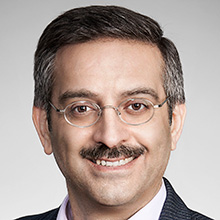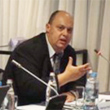
Armenia’s Karabakh Strategy, from Status Quo to Preemption  By Benyamin Poghosyan, PhD, Executive Director, Political Science Association of Armenia
By Benyamin Poghosyan, PhD, Executive Director, Political Science Association of Armenia
The settlement of Nagorno-Karabakh conflict is the number one national security priority for Armenia. Armenia guarantees the security of the people of the Nagorno Karabakh Republic, having supported Karabakh during the 1992–94 war with Azerbaijan and through the years of cease-fire. Since 1994, Armenia has been involved in negotiation process in order to resolve the conflict with Azerbaijan. In recent years talks focused on the so-called Madrid Principles prepared by international mediators. Armenia accepted these principles as a basis for settlement and expressed willingness to sign a framework agreement during the summit in Kazan, Russia in 2011. READ MORE
- EGF Editor |
Published on EGF: 27.03.2018
| Security
-
The Other Side of Conflict Resolution: Mobilizing Peace Constituencies in the South Caucasus  By Elkhan Nuriyev, BREC Global Energy Associate, EGF Affiliated Expert
By Elkhan Nuriyev, BREC Global Energy Associate, EGF Affiliated Expert
The international community has so far paid little attention to the South Caucasus where the conflict resolution process is stuck in political limbo for years. This apparent neglect and the lack of understanding of the deep-rooted issues have created an informational landscape where fake news stories harm the ordinary people and violate their fundamental right to make informed choices on the basis of accurate information that is free of deception and manipulation. In effect, the current climate of disinformation aggravates regional tensions and makes incumbent authorities vulnerable to instability. READ MORE
- EGF Editor |
Published on EGF: 27.03.2018
| Markets
-
Turkey and Russia aspire to replace a century of Western domination of the Middle East  By Benyamin Poghosyan, PhD, Executive Director, Political Science Association of Armenia
By Benyamin Poghosyan, PhD, Executive Director, Political Science Association of Armenia
An "Eurasianist" ideology is helping to consolidate a Russia - Turkey strategic alliance, as a viable tool to achieve long term strategic interests in the Middle East and beyond.
The security architecture of the Middle East is in the midst of a tremendous transformation. Since the end of the First World War the region has been under Western domination of some form or another. In 1920s and 1930s it was wrapped within the mandate system imposed by the League of Nations, and since the end of the Second World War the US has been the regional kingmaker. The Soviet Union had some footholds such as Egypt during Nasser's rule, as well as Syria and parts of Yemen. READ MORE
- EGF Editor |
| External Relations
-
Russian-Turkish Relations and their Impact on NATO and the EU By Eugene Kogan, Tbilisi-based defence and security expert
The Black Sea region is one of the regions in which Turkey has lost its influence to Russia. NATO and the EU have no influence on relations between Russia and Turkey, as NATO has no mechanism for excluding Turkey as a member state, while the EU, although it has implicitly suspended negotiations on Turkey's possible membership, it is not prepared to make a clear statement that Turkey will not join the Union in the foreseeable future. READ MORE
The Rationale behind Armenia-Georgia Strategic Partnership  By Benyamin Poghosyan, PhD, Executive Director, Political Science Association of Armenia
By Benyamin Poghosyan, PhD, Executive Director, Political Science Association of Armenia
Since gaining independence in 1991 Armenia – Georgia relations have been characterized as friendly and mutually beneficial. Georgia is one of only two routes connecting Armenia to the world and Armenia serves as a land bridge for Georgia to Iran. The mainly positive historical memories also play a role in fomenting friendly images within both societies. […] Yet, there is a lack of clear articulation of the strategic rationale behind those bilateral relations. READ MORE
- EGF Editor |
| External Relations
-
Armenia and Azerbaijan will both finalise important political transitions before the end of April  By Benyamin Poghosyan, PhD, Executive Director, Political Science Association of Armenia
By Benyamin Poghosyan, PhD, Executive Director, Political Science Association of Armenia
The convergence in the timing of key political processes in Armenia and Azerbaijan has heightened interest in Armenia regarding Azerbaijan's domestic developments.
The Azerbaijani President decision to move Presidential elections from October to April 2018 caught many in Armenia by surprise. The expert community put forward several clues on potential reasons for such a decision. The most discussed option was the possible deterioration of the economic situation in Azerbaijan in the second half of the year, which theoretically may complicate the re-election of Aliyev. READ MORE
- EGF Editor |
Published on EGF: 05.03.2018
| External Relations
-
Raising Tensions Around Iran: Should Armenia be Concerned?  By Benyamin Poghosyan, PhD, Executive Director, Political Science Association of Armenia
By Benyamin Poghosyan, PhD, Executive Director, Political Science Association of Armenia
In recent months Iran has been facing both internal and external challenges. The wave of demonstrations shook up the Islamic Republic in late December – early January 2017-2018. The expert community still has contradicting views for the main reasons of the protest movement: internal struggle between conservatives and reformists, outside meddling with main arrows targeting the US, Israel and Saudi Arabia as potential sponsors, spontaneous movement based on economic hardships and rampant corruption. READ MORE
- EGF Editor |
Published on EGF: 26.02.2018
| External Relations
-
Armenia caught in a peculiar transit trap  By Benyamin Poghosyan, PhD, Executive Director, Political Science Association of Armenia
By Benyamin Poghosyan, PhD, Executive Director, Political Science Association of Armenia
The South Caucasus is facing an infrastructure development boom. However, Armenia is in stark isolation, with no major project passing through the country.
The launch of new transit routes and transport infrastructure are key topics widely discussed within the context of the geopolitics of the South Caucasus. Since the late 1990s several new pipelines, highways and railroads have been constructed traversing the region. Given the re-emergence of Russia as a key player in the post-Soviet space, since President Putin's ascendance to power in 2000, new transport corridors and large infrastructure projects have become factors in the wider competition between Russia and western countries. READ MORE
- EGF Editor |
Published on EGF: 19.02.2018
| Markets
-
Could the EU and Russia Restore the Dialogue on European Security?  By George Vlad Niculescu, Head of Research, the European Geopolitical Forum
By George Vlad Niculescu, Head of Research, the European Geopolitical Forum
Most international analysts agree that Western relations with Russia are at their worst in thirty years, and that they are unlikely to improve unless significant geopolitical changes are going to emerge. More recently, a new academic debate has started on whether, and how, to restore the EU-Russia dialogue to meet the interests of both parties, while trying to reconcile respect for international law with principled pragmatism into creating a new European security architecture. It might be therefore worth looking at the prospects of restoring EU-Russia dialogue through the lens of security scenario planning. READ MORE
- EGF Editor |
Published on EGF: 09.02.2018
| Security
-
